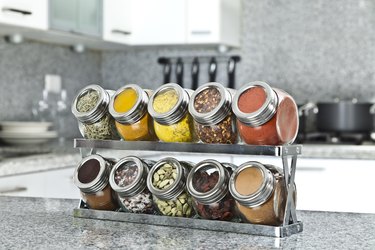
If you're like most of us, you have a cabinet or a rack filled with spices and herbs that you've inherited over the years. Yet you stick to your go-to three and only use the marjoram once in a blue moon. But just because it seems like jarred spices can withstand the test of time, that doesn't mean you shouldn't regularly replace your stockpile.
Video of the Day
Video of the Day
Do Spices Expire?
Simply put, spices do actually expire. But the good news is that you're very unlikely to get sick if you eat spices or herbs that are past their prime, chef Jennifer Kushnier tells us. So how do you know when it's time to toss 'em? Your biggest clue that it's time to go spice shopping is if the spice doesn't smell like it's supposed to.
"If you inherited your spices on your way to college, give them a sniff, and if they don't smell like what they are — if it's yellow and labeled as curry but doesn't smell like curry — get rid of it," Kushnier says. Spices and herbs tend to lose their flavor over time, so they become "bland" rather than "bad," she says.
For those leafy herbs like parsley flakes or oregano, for example, you'll start to notice a change in color. However, these spices are salvageable, Kushnier says. "Use them in a pot of chili or soup where the flavors blend together. Or if a recipe calls for one tablespoon of dried oregano, add more."
How Often Should You Replace Spices and Herbs?
So how often should you clean out the spice cupboard? "The good old' rule of thumb for replacing your spices is one year," Kushnier says. But the type of spice and how it's stored determines how long it will last. Check your seasonings against their shelf-lives below:
- Whole spices: Three to four years. (Think peppercorn, allspice and cloves.)
- Pre-ground spices: Two to three years.
- Leafy herbs: One year.
Over time, herbs and spices that may have a medicinal or nutritional benefit, like turmeric or cinnamon, may start to lose that added perk along with their smell and flavor.
The best nutritional benefit comes from fresh herbs and spices, Kelly Hogan, RD says, adding that their freshness and health benefits can diminish over time just like with other plants. "For the greatest benefits, I'd go for the fresh herbs and spices and use them within a reasonable time period," she says.
How to Store Spices for Maximum Flavor
The best way to store spices and herbs to keep them as fresh as possible for as long as possible is in air-tight containers, in a dark place and away from heat, Kushnier says.
That means your spices should be far away from the stove — and you may also want to rethink seasoning your food over a hot pot. "Heat and steam also affect the quality of your spices," Kushnier tells us. "When you shake them directly over a cooking pot, heat and steam can get in there, potentially compromising the quality."
Tip
Kushnier recommends either shaking the spice into your hand or letting the jar air out before sealing it back up.
Unless your spice jars are stainless steel or opaque, you should avoid storing them on the countertop because light exposure can decrease quality and shelf life, Kushnier says.